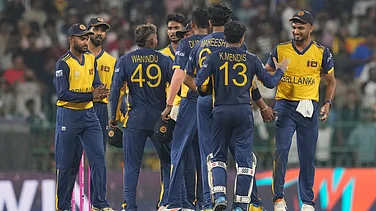The India-Sri Lanka encounter, a game of cricket that got charred beyond recognition under the powerful Eden Gardens floodlights last week, is now history, as is the controversy-ridden Wills World Cup, but Calcutta's grim battle with itself is far from over. In fact, the war may have just begun. Coming to terms with the nightmare that unfolded without warning on the evening of Wednesday the 13th and mauled the image of the city's sports-crazy populace will not be easy, especially in the light of the worldwide condemnation that the hooliganism of a minuscule section of the gigantic gathering has understandably provoked.
True lovers of cricket in the city are squirming as uncomfortable questions fly thick and fast. Are we, like the surly Pakistanis, a nation of bad losers? Is Calcutta unfit to be the premier cricketing centre its citizens and numerous former and present cricketers make it out to be? Are we witnessing the rise of indigenous equivalents of Britain's lager louts, the dreaded soccer hooligans, and in cricket at that? Who were the undesirable elements who hurled bottles, some glass ones, on to the ground when India's fancied batting line-up collapsed in an ignominious heap before the rough-and-ready wiles of Sanath Jayasuriya on a venomous dirt track?
Several days after the shameful incident that 600 million people watched live around the globe, the debate rages on like a wild bushfire in the city of a hundred and one million contradictions. In the offices of the Dalhousie business district, on the campuses of Calcutta's three principal universities, at street corners in the congested suburbs, in the drawing rooms of the more affluent, in the musty corridors of Writers' Buildings, virtually everywhere, the query is the same: why did a section of the generally well-behaved Eden Gardens crowd lose its bearing and, in 12 minutes of madness, demolish a reputation for sporting behaviour built over many decades? The answer is elusive.
While Bengali litterateurs like Dibyendu Palit argue that the city's 'sporting' image is only a myth, a figment of the media's imagination, nobody in Calcuttais willing to see the incident as anything more than an isolated occurence. The mood is despondent, no doubt. "It was a sad day indeed," says former Test cricketer Pankaj Roy. "How can we ever again claim that Eden Gardens is one of the world's best sporting arenas?" But the city's denizens feel it's rather unfair for the rest of the world to use the misguided actions of 200-odd people in a charged-up atmosphere as a stick to beat an entire city, an entire community, an entire nation, indeed an entire subcontinent, with. "It could have happened anywhere in India," argues filmmaker Mrinal Sen. "What do you expect when national pride assumes the proportions of mindless jingoism?"
The Eden outburst has taken even writer Khushwant Singh by surprise. "If it was football, I could understand. Bengal hasn't really produced any great cricketers. I never associated such juvenile behaviour with Bengalis," he says.
But Bombay-based Madhav Mantri, former Test wicketkeeper, is categorical in his condemnation. "What happened in Calcutta doesn't happen anywhere," he asserts. "I think the hype about the Calcutta crowd being knowledgeable is just that: pure hype." Soccer, he says, is Calcutta's sport, and the crowd let its 'football mentality' get the better of it. Former India batsman Dilip Sardesai, too, minces no words: "It was Indian cricket's darkest hour. The behaviour of the Calcutta crowd was in extremely poor taste. It negated the tall claims about their being very sporting and knowledgeable."
After the shock, the introspection. Like everything this city does, it's on in earnest. Calcutta's social scientists and intellectuals blame the Eden Gardens outrage on the unnecessary hype created by the media after India's triumph over Pakistan. "For seven days, perhaps more, the newspapers had no space for anything other than the World Cup, as if cricket was the only thing that mattered in life. Naturally, expectations shot up to a dangerous pitch and victory became all-important. The true spirit of sport was buried under all the hype," says filmmaker Buddhadeb Dasgupta. But like most Calcuttans, he desists from describing the incident as being symptomatic of a larger malaise: the alleged cultural lumpenisation of the Bengali community. "That's rather fanciful," he says dismissively.
Prashanta Chatterjee, mayor, now in his second term, says: "Even in a city of culture—Calcutta still is one and will always be one—there are bound to be some bad elements. Anyone who throws glass bottles at fielders cannot be a genuine sports lover. So we shouldn't give Calcutta's sports lovers a bad name and hang them."
Filmmaker Nabyendu Chatterjee elaborates: "The handful who disrupted the game were not representative of Calcutta's sports-loving masses. It was a very small matter that is being blown out of proportion. Considering the size of the crowd, the incident was very mild." There was no real violence, no clashes, no arson, just an emotional outburst which may have been out of place but certainly wasn't something to make such a big hue and cry about, he says. Litterateur Shirshendu Mukherjee agrees: "It was just anger. And isn't anger a manifestation of true love?"
Among Calcutta's masses, the anger at India's abysmal performance is palpable. The protests have taken all kinds of forms: processions, slogan-shouting, demonstrations, blackened hoardings, burning of effigies, even mock funeral rites. The sole villain of the piece is Indian skipper Mohammed Azharuddin. And the villainess? You've guessed it, Sangeeta Bijlani. In some localities, especially in north Calcutta, cricket fans have decided that it's the end of the cricketing road for Azhar. So they've got the Indian captain and the Bombay model married off in mock ceremonies so that they can live happily ever after—and leave Indian Cricket alone.
But how justified is this anti-Azhar mood? "He deserves it," says a boy who mans a public call office in north Calcutta's Beleghata. "The display at Eden was pathetic. We would have taken it in our stride had the team gone down fighting. Did we lose our cool when India lost to Pakistan in that one-dayer in the mid '80s, the one in which Salim Malik blasted our bowlers to smithereens after Srikkanth scored a great century?" A young girl, waiting at the PCO to make a call, shoots back:
"But don't you realise that you've done irreparable damage to Eden's reputation as one of the best places to play cricket in?" The boy turns defensive: "I wasn't in the stands when the bottles were flying. I left after Jadeja got out."
Contradictions again. Calcutta's rather excitable youngsters, who'd go miles to watch any sport, are not sure what to make of the mob outburst and are, therefore, quick to wash their hands of all responsibility. The city as a whole, however, is remorseful. The day after the match, local English language dailies carried an advertisement inserted by a voluntary group, Concern for Calcutta, backed by a host of leading Calcutta-based companies, which said: "We are sorry, gentlemen. It will never happen again."
A local FM radio station, together with another voluntary organisation, Round Table, took it upon itself to send over one lakh signatures from contrite citizens to Sri Lankan captain Arjuna Ranatunga to apologise for what transpired at Eden Gardens. In fact, the argument in Calcutta goes: the people who brought about an abrupt end to the India-Sri Lanka match were not cricket enthusiasts at all. A senior police official says: "The match was disrupted by people who had put thousands of rupees on the Indian team. An abandoned match ensured that they got their bet money back."
Conspiracy theories apart—the Indian team is accused of tanking because it was scared of travel-ling to Lahore, among other things—people who were at Eden Gardens on March 13 insist that the arena was a cauldron in more ways than one. The temperature was high, so was the humidity. Before the end of the first half, the stadium ran out of water and cold drinks—Coca Cola was allowed only one counter—and the people of their patience. So the violence that erupted was just waiting to happen. India's poor performance provided the spark.
Calcutta's sports lovers had nothing to do with what happened that night, feels West Bengal Congress MLA Abdul Mannan. "How many genuine cricket enthusiasts got in? Only 3,000 tickets were sold to the public. The remaining tickets ended up in the hands of CPI(M) cadres and then found their way into the black market."
And that's the general refrain. Says BJP leader Tapan Sikdar: "Every time there's a sporting event or a cultural show in the state, the ruling party and some unscrupulous businessmen hijack everything. That's precisely what happened this time too."
Whether the ruling party was actually responsible for what happened can never be ascertained, but detractors point towards the politicisation of virtually everything in the state. Coupled with it is the fact that the character of the people who go and watch cricket, not just in Calcutta but in other Indian centres as well, has metamorphosed over the past few years. The attitudes of the public, too, have changed.
Says Sitaram Yechury, CPI(M) politburo member: "I don't think the incident occurred only because of disappointment. The kind of people who watch cricket has changed." George Fernandes agrees: "It's a manifestation of the mood overtaking the people; this feeling of trying to get something out of a particular thing. I've paid money to watch you and so you better give me my money's worth."
Hanumant Singh, former Test batsman, who has 'a high regard' for the Calcutta crowd, doesn't subscribe to the view that we are a country of bad losers. "It was mob mentality that came into play at Eden. There are always a few lumpen elements, those who create such disorder. During our days,
Indians took the losses more gracefully because wins were few and far between. Now we have started winning games, so the people want India to triumph whenever it plays."
Sociologist M.N. Srinivas attributes the deterioration in crowd behaviour to the drastic changes that have taken place in a gentleman's game to which the hit-and-miss tactics of one-day cricket are absolutely alien. "It is no longer just a game," he says. "Big money and national pride are involved. That's why spectators take so unkindly to defeat." But Srinivas feels that, in a way, this might be welcome. "Surrogate wars are better than violent wars."
But Calcutta, perhaps the entire subcontinent, now has a major battle on its hands: will the world ever be convinced that the incident at Eden Gardens was a one-off happening and will not become the norm in the region? That's Googlee's parting shot to cricket freaks in a subcontinent where the game is more than a game, it's a passion. So they cannot afford to be bowled round their legs like Manjrekar and Jadeja were on March 13. That would be a defeat infinitely worse than the one India suffered at Eden.






















